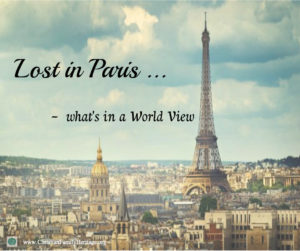 Worldview
Worldview
Our Launching Place and Destination
I once got lost in Paris – true story. I was serving in Amsterdam with Youth with a Mission (YWAM) and our team had traveled to Paris for a long weekend. On the last day of the visit our team separated to various must-see destinations and agreed to meet at a specific train station at 1:00pm. When my small group of 3 stepped out of the subway system at 12:30pm, we were at the wrong station. In a panic we re-entered the subway maze and arrived at the right station just minutes after the train left. I learned that if the train schedule says departure at 1:18pm there is no changing that.
With no interpreter we were left at the mercy of broken communication and eventually placed on a train we were told would take us to Amsterdam. Very, very late in the evening, our train came to the literal end of the line and everyone disembarked. We were in the middle of Belgium. We spent the night in the country station on miserable, wooden benches.
We re-boarded the next morning with a horde of commuters and arrived in Amsterdam about midday, exhausted and wiser.
When you board a given train, you have just chosen a destination. Better find out up front where that train is headed.
The same is true for worldviews. A worldview is the deep-seated locomotion of every person, every family, and every nation.
What is a worldview?
Simply stated, worldview is the way individuals and groups look at their world. It is the “lens” through which people think about their lives and make their decisions. Everyone has a worldview. Every culture is characterized by its dominant worldview. Every Christian should understand worldview.
The answers to these basic truth questions determine the worldview of any group or individual:
- Does God exist?
- Who is God? How is He characterized?
- How does God reveal Himself? What does He require?
- Who is man? What is the nature of man? How does man relate to God?
- Where did we come from? How did it all begin?
- Why do we exist?
- What is good? What is evil?
- What is truth?
Worldviews Define Culture
When an individual, family, community, people group or nation answers worldview questions in united ways, those answers become the foundation for their culture. By default, the answers to the worldview questions become their destination even when:
- The answers are unannounced, unclear, or misunderstood
- The answers are ignored – people do not think about the answers to the questions any more
Expressing Worldview
The worldview of any culture, whether modern or ancient, eastern or western, third world or world power, democratic or communist, world empire or primitive tribe, is expressed in these very visible categories:
- Philosophy
- Government, laws, structure of leadership
- Religion, ethics, morals
- Economics
- Education
- Literature
- Art: music, fine art, architecture, dance
- Culture: dress, food, entertainment
- Science
- Technology
- Media
Worldview is influential. It is passed to generations – as seen in religion, philosophy, government, and education. It is often celebrated – as seen in the arts and media.
The logical destination of worldviews can be observed:
- Purely Communist answers to worldview questions lead to a culture that looks similar to China or North Korea.
- Purely Islamic answers lead to cultures similar to those seen in the Middle East.
- Purely Hindu answers lead to a culture like India’s.
- Evolution’s answers have logical conclusions that affect every area of life.
- Current Post-Christian European and American answers have led us to our present culture.
What we believe becomes our way of life.
Making a Difference in Our Present Culture
For Christians, the Scriptures irrevocably answer worldview questions; we must resolve to stand united in our core beliefs. These beliefs should lead to actions that move us toward a holy destination – the narrow path to our Father’s heart. In His heart we come face-to-face with the precious people Jesus died to save.
The Gospel transforms worldviews and changes the journey and destination of individuals, which changes families, which changes communities, which eventually changes nations.
The question is how to be an instrument of change. All of us hold places of influence. In those God-given structures and realms we are called to speak and act in transformative ways: We speak and do LIFE.
- Our most important contribution is to consistently train our children in a Christian worldview.
- We can also take the daily opportunities that God gives us to ask valid questions and listen with genuine interest as people express their story and beliefs. (Sometimes study becomes a part of understanding.) As these conversations deepen into trusting relationships, we may gain the honor of sharing about the Lord we love so much. But remember: it is wise to understand our own worldview before assisting others with theirs.
Our commission is to be witnesses of life-changing truth. Sometimes this means we must confront the worldviews of our generation just as the Christians of past generations were compelled to confront theirs. Jesus commanded us to make disciples of all nations . . . (Mat. 28:19). And that includes our own.
Love is Highest Law
For those of us who follow Christ, love is the Kingdom’s highest law. I believe that in the end, Jesus will ask us, “Did you learn to love?” In this current political environment of clashing worldviews, our transparent, disarming love is key. Hate breeds hate. Fear paralyzes or builds platforms motivated by fear. But love transforms! “Love never fails . . . the greatest of these is love (I Cor. 13: 8, 13).”




Leave a Reply